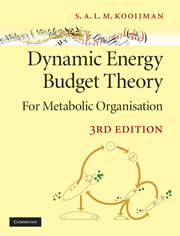Book contents
- Frontmatter
- Contents
- Preface
- 1 Basic concepts
- 2 Standard DEB model in time, length and energy
- 3 Energy, compounds and metabolism
- 4 Univariate DEB models
- 5 Multivariate DEB models
- 6 Effects of compounds on budgets
- 7 Extensions of DEB models
- 8 Covariation of parameter values
- 9 Living together
- 10 Evolution
- 11 Evaluation
- References
- Glossary
- Notation and symbols
- Taxonomic index
- Index
1 - Basic concepts
Published online by Cambridge University Press: 05 June 2012
- Frontmatter
- Contents
- Preface
- 1 Basic concepts
- 2 Standard DEB model in time, length and energy
- 3 Energy, compounds and metabolism
- 4 Univariate DEB models
- 5 Multivariate DEB models
- 6 Effects of compounds on budgets
- 7 Extensions of DEB models
- 8 Covariation of parameter values
- 9 Living together
- 10 Evolution
- 11 Evaluation
- References
- Glossary
- Notation and symbols
- Taxonomic index
- Index
Summary
The purpose of this chapter is to introduce some general concepts to prepare for the development of the simplest version of deb theory, which is discussed in the next chapter. I start with the explanation why the organisation level of the individual plays a key role in deb theory, followed by homeostasis concepts. Mechanisms for homeostasis and evolutionary aspects are discussed later. Then we need to introduce the notion of life stages and effects of temperature in some detail.
Individuals as dynamic systems
The basic level of metabolic organisation
From a systems analysis point of view, individuals are special for metabolic organisation because at this organisational level it is relatively easy to make energy and mass balance. This is important, because the conservation law for energy and mass is one of the few hard laws available in biology. At the sub- and supra-individual levels it is much more difficult to measure and model mass and energy flows.
Life started as an individual in evolutionary history, see {386}, and individuals are the units of selection and the survival machines of life; differences between individuals are, in combination with selection, key to evolution. deb theory captures these differences by parameter values, which can differ between individuals, see Chapter 8.
Individuals are also special because behaviour is key to food intake and food selection (food fuels metabolism) and to mate selection; reproduction controls survival across generations in many species.
- Type
- Chapter
- Information
- Publisher: Cambridge University PressPrint publication year: 2009
- 1
- Cited by



